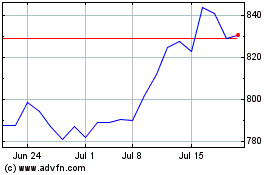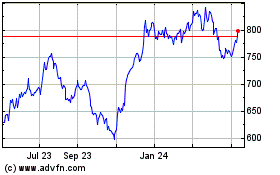By Ryan Dube and Andrew Scurria
Argentina's government has reached an agreement with three
groups of creditors to restructure its debt in a step that will
grant significant debt relief to the country, the nation's Ministry
of Economy said.
The agreement "will allow members of the three groups of
creditors to support Argentina's debt restructuring proposal and
grant the country significant debt relief," the ministry said.
Under the agreement, Argentina will change the payment dates for
some new bonds, which won't lead to an increase in the overall
amount of interest payable by Argentina but will improve the value
of the proposal for creditors, it added.
Many creditors that bet on an Argentine economic resurgence in
recent years lost money when the government took steps toward
restructuring and bonds plummeted in value. But some investors
bought in at depressed prices and stand to make profits on the
restructuring, people familiar with the matter said.
Major Argentine bondholders include Fidelity Management &
Research Co., Monarch Alternative Capital LP, VR Capital Group,
Greylock Capital Management and Pharo Management LLC.
"It prevents a really disastrous impasse that could have locked
Argentina out of credit markets potentially for years," said
Benjamin Gedan, an Argentina expert at the Wilson Center, a
Washington policy group. "This scenario of a prolonged dispute that
would have left Argentina once again isolated financially would
have been a worst-case scenario for everyone involved."
The creditors accepted a deal ahead of a Tuesday deadline set by
the government. Economy Minister Martín Guzmán had said the
government wouldn't improve its offer and would start talks with
the International Monetary Fund on refinancing a bailout loan if
there wasn't a deal with bondholders.
Argentina owes $44 billion to the IMF, which has said the
country's debts are unsustainable and projected a nearly 10%
economic contraction this year.
Economic contraction, spiraling inflation, a hard-currency
squeeze combined with the coronavirus pandemic made Argentina the
largest of several sovereigns to seek concessions from creditors
this year, joining Ecuador and Lebanon as lockdowns and travel
restrictions roiled the global economy.
Slashing the country's debts has been a priority for President
Alberto Fernández, a member of the nationalist Peronist movement
who took office in December. The country has been mired in a
recession since a 2018 currency crisis while facing double-digit
inflation.
Argentina has spent the bulk of the last two decades quarreling
with investors after it stopped payment in 2001 on more than $80
billion in debt, the largest default in history by a sovereign at
the time. Most bondholders settled for roughly 30 cents on the
dollar while a minority battled for full repayment, eventually
winning U.S. court rulings that led to another default in 2014
before a settlement in 2016 that delivered enormous gains to the
few determined holdouts.
Debt markets soon welcomed the country back, gobbling up
100-year bonds, the first such issuance of so-called century bonds
by a junk-rated government.
Last year's election of Mr. Fernández fueled concerns about a
prolonged dispute with creditors after he announced plans to
restructure tens of billions of dollars in debt he inherited from
his predecessor, Mauricio Macri.
Mr. Fernández's powerful vice president, Cristina Kirchner, who
governed from 2007 to 2015, often blamed Argentina's economic
troubles on the IMF and foreign creditors, which her government
referred to as "vulture funds." But Mr. Fernández, a more moderate
Peronist, was more willing to sit down with creditors, analysts
say.
Argentina's dire economic outlook, worsened by a pandemic that
has caused a surge in poverty in the vast working-class
neighborhoods that surround Buenos Aires, likely helped the two
sides reach a deal, said Nicolás Saldias, a political analyst and
expert on Argentina.
"I think there certainly was a role played by Covid-19 in
reducing the expectations of creditors of what is reasonable and
what is acceptable almost morally in this context," said Mr.
Saldias. "For the creditors, it would look bad if you are asking in
the middle of the worst economic recession since the Great
Depression and a pandemic which is killing hundreds of people...in
the country for an exorbitant amount of money."
Negotiations were difficult at times, reflecting disagreements
among bondholders over the size of discount they were willing to
take. Differences reflected factors including the different prices
at which various creditors purchased Argentine bonds.
BlackRock sought earlier this year to broker a deal but faced
resistance from certain creditors. Throughout the process,
bondholders were aware that they were the subject of critiques in
the local press and from economists that they were taking advantage
of Argentina. Over the weekend, creditor groups started to coalesce
around a deal. They felt reaching agreement quickly was preferable
in light of the economic damage wrought by the pandemic, two people
familiar with the matter said. Some believed the IMF would be less
willing to be generous to creditors if the spread of Covid-19 hurt
the Argentine economy further.
Argentina could now face more difficult talks with the IMF over
restructuring its bailout from the fund, which will likely pressure
the government to pass economic reforms that are unpopular in the
country and opposed by the ruling Peronists.
"It is going to be really politically dangerous in Argentina,"
said Mr. Saldias. "The IMF's board is not just going to roll over
and give Argentina whatever it wants."
--Pietro Lombardi, Alexander Gladstone and Dawn Lim contributed
to this article.
Write to Ryan Dube at ryan.dube@dowjones.com and Andrew Scurria
at Andrew.Scurria@wsj.com
(END) Dow Jones Newswires
August 04, 2020 07:45 ET (11:45 GMT)
Copyright (c) 2020 Dow Jones & Company, Inc.
BlackRock (NYSE:BLK)
Historical Stock Chart
From Mar 2024 to Apr 2024

BlackRock (NYSE:BLK)
Historical Stock Chart
From Apr 2023 to Apr 2024
